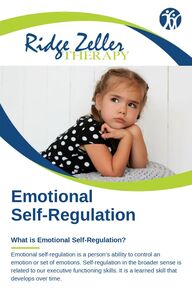
Return to flip book view
Emotional Self-RegulationEmotional self-regulation is a person’s ability to control anemotion or set of emotions. Self-regulation in the broader sense isrelated to our executive functioning skills. It is a learned skill thatdevelops over time. What is Emotional Self-Regulation?If you have questions about your child’s behavior or would like to learndifferent strategies to help you solve any challenging problems,parenting consultation appointments are available.Parenting ConsultationNo-Drama Discipline – by Daniel J. Siegel, M.D. and Tina PayneBryson, Ph.D.Easy to Love, Difficult to Discipline – by Becky A. Bailey, Ph.D.Good Inside – by Dr. Becky KennedyThe Emotional Lives of Teenagers – by Lisa Damour, Ph.D.Parenting BooksThe Way I Feel, by Janan Cain Listening to My Body – by Gabi GarciaI Am Peace – by Susan VerdeGrumpy Monkey – by Suzanne LangAlphabreaths: The ABC’s of Mindful Breathing – by Christopher Willard and Daniel RechtschaffenBooks for KidsRidgeZellerTherapy.comTo schedule a consultation orevaluation call 480-365-9981
Additional IdeasMovement may be helpful for your child in regulating their emotions(e.g., take a walk, go on a swing, dance, stretch). Interoception is our awareness of what is happening inside ourbodies (e.g., hunger, thirst, fatigue, emotions). It is the foundation ofself-regulation. Ways to increase interoception include: Practicing mindfulness.Mindfulness check-ins (helping your child recognize what ishappening in their bodies).Practicing deep breathing or counting to calm down.Movement-based mindfulness practices such as yoga or tai chi. “Co-regulation is an active partnership. A caregiver’s calmand steady physical presence fills the gap ofdevelopmental immaturity during the time when a childfeels and acts out of control.” -via Neurochild CommunityEmotional impulsivityLow frustration toleranceSudden mood swingsTemper outbursts (or more severe verbal, aggressivebehaviors)Trouble maintaining friendshipsWhat does difficulty with emotionalself-regulation look like?As a parent you may be wondering if your child’s behaviors areconsidered “normal.” We expect children who are 2 years old tohave difficulty regulating their emotions. It may not be until ourchildren are school-aged that we discover they are havingproblems controlling their emotions. Children with certain mentalhealth conditions such as anxiety or Attention-Deficit/HyperactivityDisorder are more likely to have difficulty in developing theiremotional self-regulations skills. How do you know if your child is strugglingwith emotional self-regulation?Self-regulation develops from connection with parents/caregivers.It is not about avoiding a situation that may cause dysregulation butrather how you can help your child during their dysregulation.When your child is dysregulated, the best way to help them isthrough co-regulation. It is important to first recognize and regulateyour own emotions. Two concepts identified by Dr. Dan Siegel are particularly useful."Connect before you redirect." Remind yourself that you have agood child who is having a difficult time. Validate your child’sfeelings even if you do not like the behavior. Help your child labeltheir emotions or "Name it to tame it.” Once your child is regulated, you can talk to them about whathappened.How can you help your child develop emotionalself-regulation skills?
Additional IdeasMovement may be helpful for your child in regulating their emotions(e.g., take a walk, go on a swing, dance, stretch). Interoception is our awareness of what is happening inside ourbodies (e.g., hunger, thirst, fatigue, emotions). It is the foundation ofself-regulation. Ways to increase interoception include: Practicing mindfulness.Mindfulness check-ins (helping your child recognize what ishappening in their bodies).Practicing deep breathing or counting to calm down.Movement-based mindfulness practices such as yoga or tai chi. “Co-regulation is an active partnership. A caregiver’s calmand steady physical presence fills the gap ofdevelopmental immaturity during the time when a childfeels and acts out of control.” -via Neurochild CommunityEmotional impulsivityLow frustration toleranceSudden mood swingsTemper outbursts (or more severe verbal, aggressivebehaviors)Trouble maintaining friendshipsWhat does difficulty with emotionalself-regulation look like?As a parent you may be wondering if your child’s behaviors areconsidered “normal.” We expect children who are 2 years old tohave difficulty regulating their emotions. It may not be until ourchildren are school-aged that we discover they are havingproblems controlling their emotions. Children with certain mentalhealth conditions such as anxiety or Attention-Deficit/HyperactivityDisorder are more likely to have difficulty in developing theiremotional self-regulations skills. How do you know if your child is strugglingwith emotional self-regulation?Self-regulation develops from connection with parents/caregivers.It is not about avoiding a situation that may cause dysregulation butrather how you can help your child during their dysregulation.When your child is dysregulated, the best way to help them isthrough co-regulation. It is important to first recognize and regulateyour own emotions. Two concepts identified by Dr. Dan Siegel are particularly useful."Connect before you redirect." Remind yourself that you have agood child who is having a difficult time. Validate your child’sfeelings even if you do not like the behavior. Help your child labeltheir emotions or "Name it to tame it.” Once your child is regulated, you can talk to them about whathappened.How can you help your child develop emotionalself-regulation skills?
Emotional Self-RegulationEmotional self-regulation is a person’s ability to control anemotion or set of emotions. Self-regulation in the broader sense isrelated to our executive functioning skills. It is a learned skill thatdevelops over time. What is Emotional Self-Regulation?If you have questions about your child’s behavior or would like to learndifferent strategies to help you solve any challenging problems,parenting consultation appointments are available.Parenting ConsultationNo-Drama Discipline – by Daniel J. Siegel, M.D. and Tina PayneBryson, Ph.D.Easy to Love, Difficult to Discipline – by Becky A. Bailey, Ph.D.Good Inside – by Dr. Becky KennedyThe Emotional Lives of Teenagers – by Lisa Damour, Ph.D.Parenting BooksThe Way I Feel, by Janan Cain Listening to My Body – by Gabi GarciaI Am Peace – by Susan VerdeGrumpy Monkey – by Suzanne LangAlphabreaths: The ABC’s of Mindful Breathing – by Christopher Willard and Daniel RechtschaffenBooks for KidsRidgeZellerTherapy.comTo schedule a consultation orevaluation call 480-365-9981